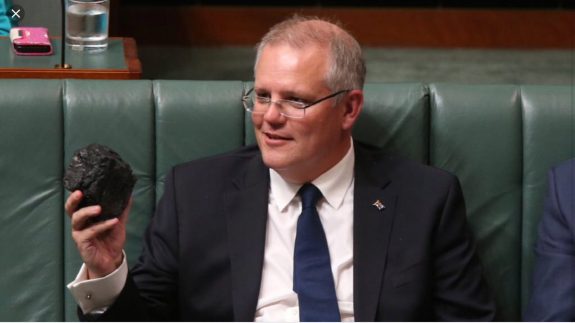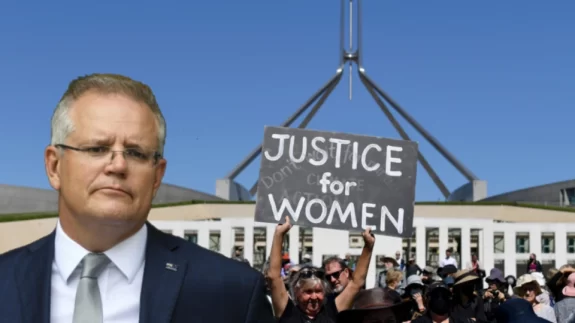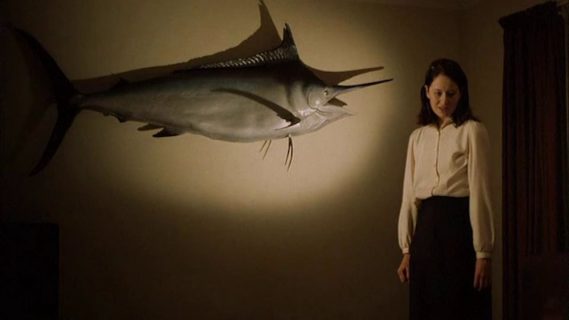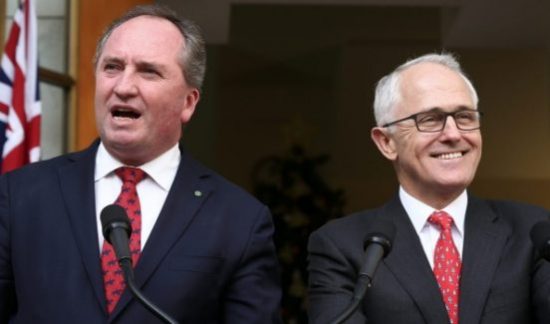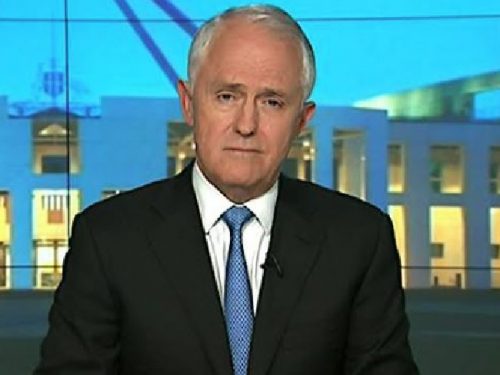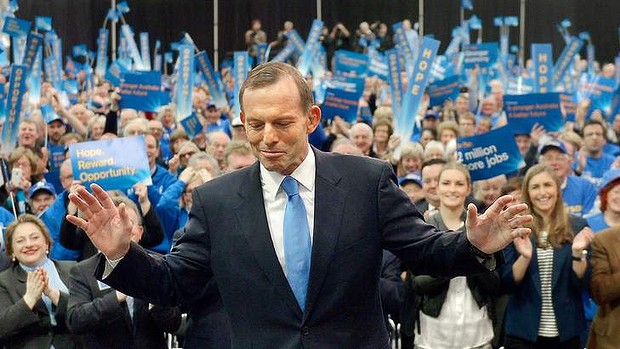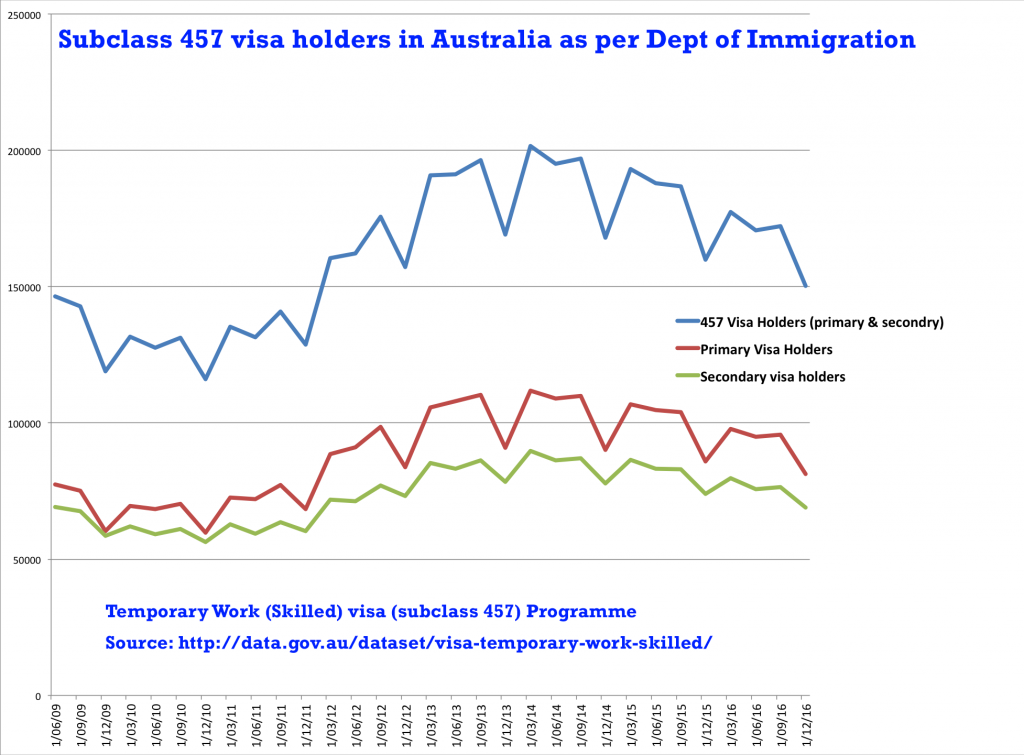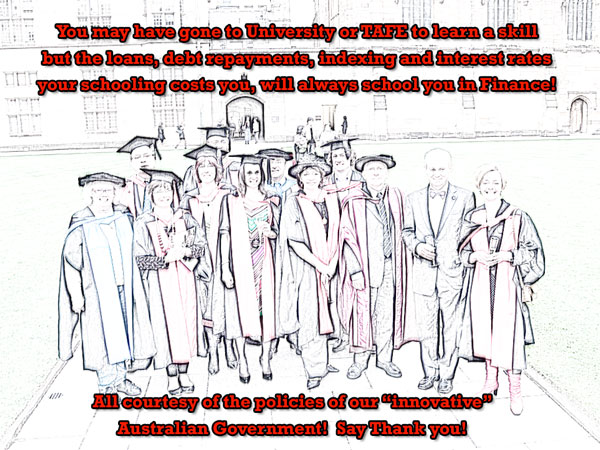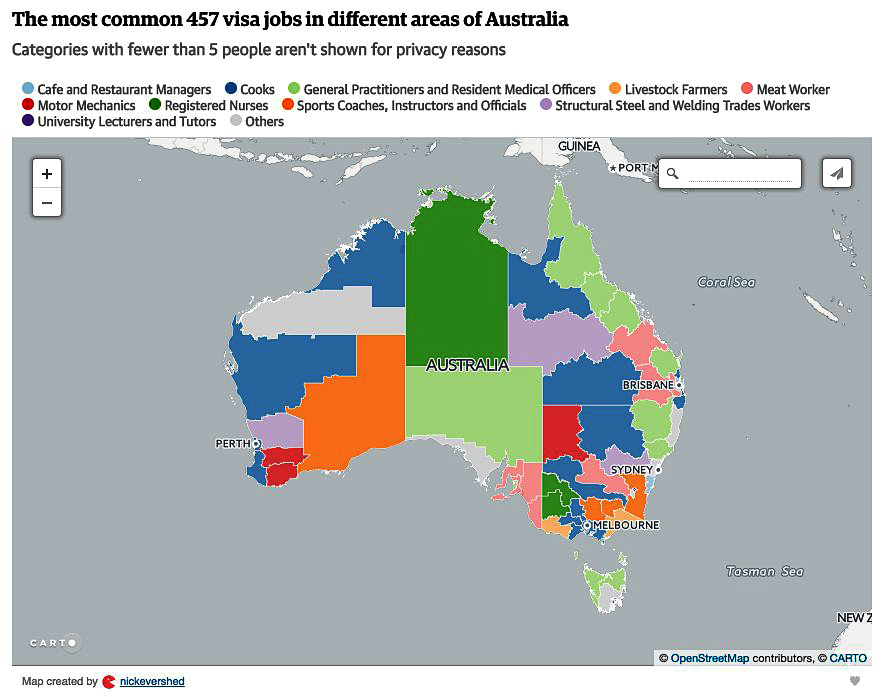Does the Coalition have a woman problem? Or a “female” problem as Education Minister and Gonski-con-artist, simple Simon Birmingham puts it? Or just your everyday, run of the mill, neoliberal lack of humanity problem?
Certainly, our heart of stone; our national emotional deficit and compassion bypass, betray us this week as parvenus on a world stage of freakish weirdness which features US Evangelicals blessing Trump’s moving the US embassy from the Sodom and Gomorrah of modern Tel Aviv to Jerusalem, a move which sees Israeli snipers open fire on unarmed Palestinian protestors, a move we alone condone by voting with the US against any UN inquiry.
Weirdness? As all true believers know in their hearts, Hallelujah, Trump’s removalists will hasten the final trump, the apocalypse, the rapture in which all (evangelical) Christians living and dead will be united.
Trump himself, on the campaign trail in 2016, displays a Bible in which, he says, his mother has written his name and address, “She wrote the name and my address and it’s just very special to me,” he said, in a quiet voice. Your name generally is.
It’s as touching as the label on Paddington Bear but it’s hailed by Fox News cubs as incontrovertible evidence of The Donald’s moral rectitude and piety. No true believer worries much when the next day the President mistakes the silver communion plates that are passed around for the offering plates, at church in Council Bluffs Iowa reaching for dollar bills from his pocket. No Trump voter would find reason to question he often he attended such services. Others will find the gaffe quite telling.
Our own divine afflatus – our ascent to the UN Human Rights Council is similarly moving. We mealy-mouth all the right platitudes about how we care about human rights; how much we love a “rules-based order”, a meaningless American buzzword Julie Bishop invokes incessantly – while pretending the Rohingya genocide isn’t happening or is something else, a benign or even blessed event, she archly calls a Myanmar “security operation”.
It works. We’re elevated to the council, up snug alongside The Philippines with its you-beaut-shoot-first rule of law, networking with Burundi, Egypt, Rwanda, Cuba, Venezuela, China, India, Saudi Arabia and the United Arab Emirates – all of whom share with us the distinction of being censured by the UN for their human rights violations
So what can little Australia do? This week we show how we alone can publicly suck up to Trump; prove ourselves US zǒu gǒu, as the Chinese call running dogs or lackeys, much to our global infamy, ignominy and shame.
We are the only nation in the world to side with the US in voting against the UN Human Rights Council‘s (UNHRC) call for an international inquiry into the state of human rights in East Jerusalem, the West Bank and Gaza.
Why? The UNHRC condemns Israel for shooting dead over sixty protesters including civilians, journalists, children and armed militants, in the Strip. Injured are hundreds more, at a mass protest in which tempers are inflamed by America’s recent pro-Likud decision to move its embassy to Jerusalem – a promise Mafioso Don says he must honour. He cares more about re-election than the lives and rights of or any human beings; let alone Islamists.
Is there something cultural about chicanery, bigotry and cold-blooded murder? Something we don’t get?
The massacre ends six weeks of protests at the Gaza border, part of the “Great March of Return” led by Gaza’s rulers, Hamas, the largest of several Islamist Palestinian groups. Israel is given ample warning. The UNHRC and many other observers, shocked by the brutality, call out Israel for acting illegally; using disproportionate force.
It’s not as there’s no time to prepare a more humane and proportionate response. Hamas made it clear it would intensify its protests before Tuesday, when Palestinians hold their annual commemoration of the Nakba or Catastrophe. The foundation of Israel on 14 May 1948 forced 750,000 Palestinians from their homes into exile.
Australia’s opposition to the inquiry has been deplored by human rights groups, who say Australia has broken its pledge to uphold human rights and improve its own human rights record – in particular its abysmal record on indefinite offshore detention, as well as structural Indigenous disadvantage, juvenile justice and disability rights.
Lachlan Strahan, Charge D’Affaires of Australia’s mission to the UN in Geneva, gave the “incoming members’ pledge” publicly mouthing our nation’s undertakings to fight for human rights when joining the UNHRC.
Just for the record we are committed to promote gender equality; good governance; freedom of expression; indigenous rights; and strong national human rights institutions. (Nothing as naff as demanding ID at airports).
Yet for many, including Daniel Webb of the Human Rights Law Centre, words are cheap. “It’s important to hear our government promise to strengthen the UN system and to start respecting human rights findings,” he says. “The world will be a fairer and more humane place if we have a strong and effective international human rights system.
“But just saying over and over again that you respect human rights doesn’t make it true, not for the innocent human beings warehoused on Manus and Nauru for the last five years, or the Aboriginal and Torres Strait Islander men, women and children being forced into prisons away from their families and communities at obscenely high rates.”
Anthony Albanese asks the government to explain itself and cops a hammering on ABC Insiders, Sunday, from Barrie Cassidy who’s after a gotcha moment. He presses Albo to endorse the NSW ALP’s conference’s motion to unilaterally recognise the state of Palestine.
Imagine what the Daily Telegraph or The Australian could do with news of Labor endorsing Islamic terrorists.
Albanese blusters; comes up with the Two State Solution, which sounds like a dance step or something you’d use in a chemistry lab but gives life to the absurd but pernicious myth that Palestine and Israel are equal.
The two state solution, is neither confined to two states nor a solution but a war of attrition backed by The Great Satan (as the US is fondly reviled in the Middle East). It originates in the UN’s 1947 division of Palestine into two states with a large area around Jerusalem to be run by the UN. Over half the country was to go to 34 per cent of the population; the Jewish minority. The smaller part of the country went to the overwhelming Arab majority.
Arabs rejected the partition resolution. They could see how unfair it was. The injustice still rankles; festers.
For Hamas, which came to power in Gaza in 2007, Monday’s border protest is the culmination of a week -long campaign to try to break Israel’s blockade. The group has led weekly protests near the border with Israel since late March. Over 100 Palestinians are shot dead. Hundreds are wounded in the series of weekly protests.
The dead include eight children under the age of sixteen while 2,700 people are wounded.
The UNHRC votes 29-2 with 14 abstentions to back a resolution that also condemns “the disproportionate and indiscriminate use of force by the Israeli occupying forces against Palestinian civilians.” An “independent, international commission of inquiry” mandated by the council will be asked to produce a final report next March.
Luckily, local right wing scribes such as Gerard Henderson and fellow Catholic Boys’ Daily (The Australian) pontificator Greg Sheridan are on hand to explain to our nation how the deaths are all the fault of the Palestinian victims who were in the process of “pulling a fence down” and deliberately exposing babies to danger evoking John Howard’s 2001 “babies overboard” canard, a lie which helped him win an election.
Sheridan sagely and courageously choruses, “As Prime Minister Malcolm Turnbull pointed out, the terror group Hamas, which controls Gaza, purposely pushed tens of thousands of rioters towards the Israeli border in the certain knowledge that the Israeli defence forces would not allow them to breach that border.”
Australian media generally, however, follow Julie Bishop’s lead. Bishop reiterates the US line; framing a war crime with no perpetrator. No hint that 750,000 Palestinians were displaced in the creation of the state of Israel in 1948. No point in recalling Israel’s Irgun strategy of a series of selected killings of Palestinian civilians from 1930.
From 1930, Guy Rundle writes, Irgun, a group of young bloods … injected into clashes between Arabs and European Jews a new element: precise, targeted terror against random Arab civilians.
In our postmodern, lobotomised, mass-mediated world, complex issues, events and conflicts are tidied up by obliterating historical context. It makes finger-pointing, demonising and confected outrage; mass manipulation so much easier.
Palestinians suffer institutionalised discrimination by Israel, reports Human Rights Watch. It’s apartheid. In its 50-year occupation of the West Bank and Gaza, Israel’s systematic rights abuses include collective punishment, routine use of excessive lethal force, and prolonged detention, without charge or trial, for hundreds.
Palestinians are daily made to suffer human rights violations surpassed only by the indefinite detention we inflict on those whom we catch seeking refuge in Australia by sea. To say nothing of our no dobbing laws, The Australia Border Force Act 2015, which prohibits doctors, media, professional groups, international human rights bodies, NGOs and others from blowing the whistle on brutality and inhumanity.
Many Palestinians caught in videos of the recent “riots” in Gaza are refugees. Yet erased from our mainstream media is the history of Israeli construction of illegal settlements in the occupied West Bank; how Israel steals Palestinian land and water and how its much vaunted “two state solution” is a way of diverting attention from its apartheid regime; from burdens it imposes on Palestinians but not on settlers, restricting Palestinians’ access to basic services and making it nearly impossible for them to build in much of the West Bank without risking demolition.
Israel repeatedly denies Palestinians permits to build schools in the West Bank and demolishes those built without permits denying access to education for thousands of children, Human Rights Watch reported, last month.
Israel’s decade-long closure of Gaza, supported by Egypt, severely restricts the movement of people and goods, with devastating humanitarian impact, reports Human Rights Watch.
Extremism is all corrupting writes David Brooks in The New York Times. The Palestinian Authority in the West Bank and Hamas in Gaza both sharply restrict dissent, arbitrarily arresting critics and abusing those in their custody. The process is not unknown in Australian conservative political circles but we excel at extradition and rendition.
Bishop expresses the government’s “deep regret and sadness over the loss of life and injury”, in a press release entitled Palestinian Protests in Gaza as if some natural catastrophe has killed sixty Palestinians rather than Israeli Defence Force snipers’ bullets and tear gas. Israelis call their anti-terror programme “cutting the grass”.
Israel makes Gazans non-persons and thereby all the easier to mow down. Similarly Peter Dutton’s personal fiefdom, The Department of Home Affairs, confirms, this week that it is ending financial assistance to “transitory persons” who haven’t returned to Nauru or Papua New Guinea after coming to Australia for medical treatment. It’s as dehumanising and as criminally contrary to our human rights obligations as calling those wretched souls who seek our refuge by boat “illegals”.
$200 per fortnight of housing assistance and income support is stripped mainly from families with young children. But Home Affairs is all heart. It generously gives most of the refugees six weeks to find new shelter and a source of income. Others are given three weeks to find accommodation but lose income support immediately.
Charity begins at home, of course, and the nation wakes Monday to learn that the wondrously named, Jane Prentice, Assistant Minister for Disability Services is the latest victim of our federal government’s inherent sexism and dog-eat dog philosophy. She loses pre-selection to Julian Simmonds, a younger, sexier male party member, a fate which government MPs rush to assure us is the Liberal Party’s democracy in action. Or meritocracy.
Gerard Henderson kindly sinks the slipper by accusing Prentice of under-performance, a novel political criterion which if it were to be applied rigorously would certainly terminate the careers of Tony Abbott, all-hat and no cattle Barnaby Joyce and even our puppet of the right Prime Minister himself to name but a few recent stellar duds.
Beyond Abbott and other political mediocrities is a long line of hapless male MPs which neatly counter the argument Coalition blokes put up against quotas for women preventing MPs from being elected on merit. Merit? Barnaby Joyce?
Only 22.6 per cent of federal Liberal MPs are women. Of 76 Coalition MPs in the lower house, only 13 are women. And only 35 per cent of women voted for the Coalition last election. The two statistics cannot possibly be related.
Discussion veers hard right (as always) this week to posit a Liberal party political machine which is responding to hard times by wheeling further to the right. It’s not sexism or misogyny but just an accidental turn of the political screw.
ABC panel members on The Drum or Insiders and other huff and fluff shows, in particular air the view that the party’s discrimination against women is all ideological. Perhaps they’ve missed how in general, on average, Australian women have to work an extra 56 days a year to earn the same pay as men for doing the same work.
Ann Sudmalis may also lose pre-selection for Gilmore to real-estate agent Grant Schultz, son of the late, great (John) Alby Schultz. (Alby, federal MP for Hume 1998-2013, was one of several Liberals along with Don Randall, Wilson Tuckey, Concetta Fierravanti-Wells, Dennis Jensen and Sophie Mirabella, who boycotted Parliament on the day that the formal apology to the Stolen Generations was made by then Prime Minister Kevin Rudd.) Clear merit is apparent in the Schulz bloodlines.
By Thursday, “Birmo” has sized up the problem. “Blokes face just as many preselection challenges as females,” he tells ABC radio. Sure they do, Birmo. We know. And all over Australia Liberal blokes are being challenged by women. Nothing his government of reality denying privilege protectors can do about it.
Just as his government has no plans to address the injustice of our nations’ workplaces where women earn on average $48,690 in 2015-16, yet $63,000 is the median taxable income for men. In fact, according to the National Foundation for Australian Women, its tax offsets proposed for 2018 increase the effective marginal tax rate by 1.5% within the taper zone, which increases work disincentives for women and other low earners.
As Matt Holden notes in Fairfax, when a Coalition bloke challenges another, it does nothing to make our government any less of a patriarchal atavism. Only 21% of Liberal Party federal MPs and a mere 14% of the Nationals’ representatives are women. And falling. Luckily Liberal sophist Scott Morrison has the answer.
“Politics is a contestable process” booms party queue-jumper, Morrison, who owes his own safe Liberal seat of Cook less to his own merit than to The Daily Telegraph‘s four defamatory 2007 attacks on Michael Towke, a character assassination which led the NSW Liberal Party to dis-endorse his Lebanese-Christian opponent.
Morrison lost pre-selection comprehensively on first ballot, in July 2007, receiving 8 votes to Towke’s 82.
Two senior Liberal blokes then phoned The “Tele” which ran four stories painting Michael Towke as a liar. Towke contends that the third story entitled ”Party split as Liberal candidate faces jail,” put his mother in hospital.
Towke would eventually win his legal war, but his political career was ruined. ScoMo’s story shows that conservative politics is eminently contestable if you are a WASP bloke with powerful old white male party pals.
No hope for Jane Prentice. A sorcerer’s apprentice in reverse, her role consisted largely in keeping mum about how, like its predecessor, the Turnbull government continues to kick welfare expenditure reduction goals by “transitioning” a weasel word for denying disability support pensioners to the needy.
They’ll thrive on the starvation rations of the Centrelink Newstart program. Yet Prentice is clearly an MP with a love of family. She claimed $14,039 for her husband to fly between Canberra and Brisbane 24 times during her first term in Parliament. Twenty-one trips were in business class. Her claim of $352 for her spouse to be chauffeured, however, shows exemplary frugality and should inspire all other MPs to follow suit.
Like what we do at The AIMN?
You’ll like it even more knowing that your donation will help us to keep up the good fight.
Chuck in a few bucks and see just how far it goes!
Your contribution to help with the running costs of this site will be gratefully accepted.
You can donate through PayPal or credit card via the button below, or donate via bank transfer: BSB: 062500; A/c no: 10495969

